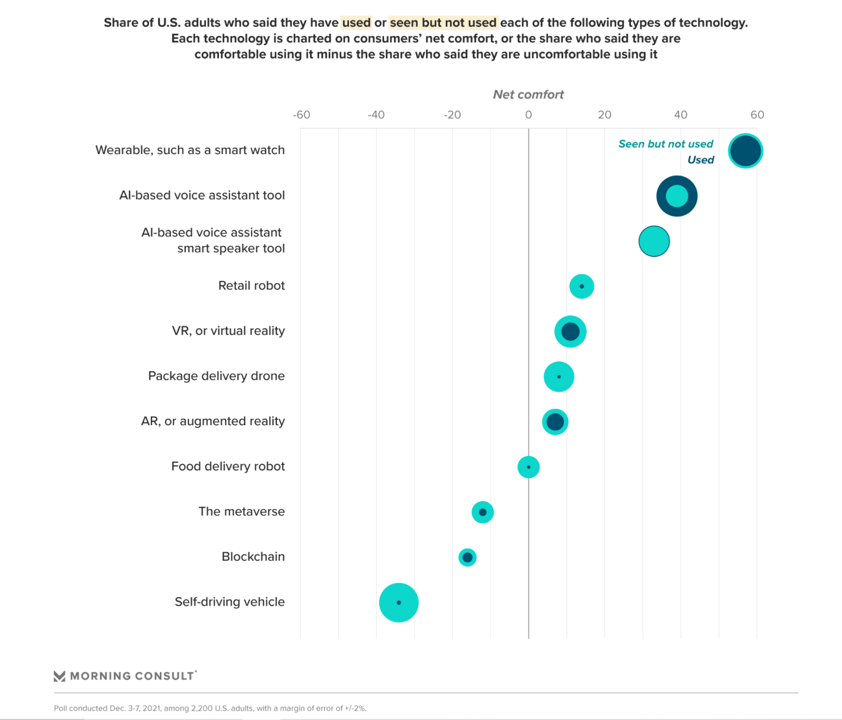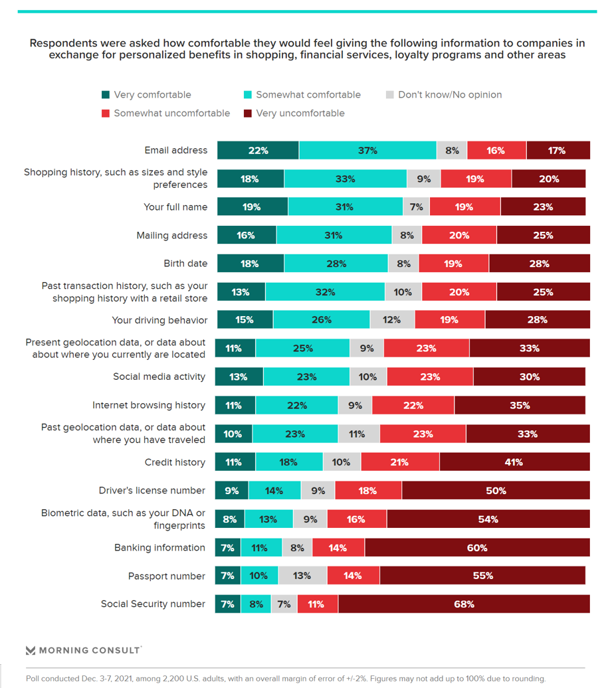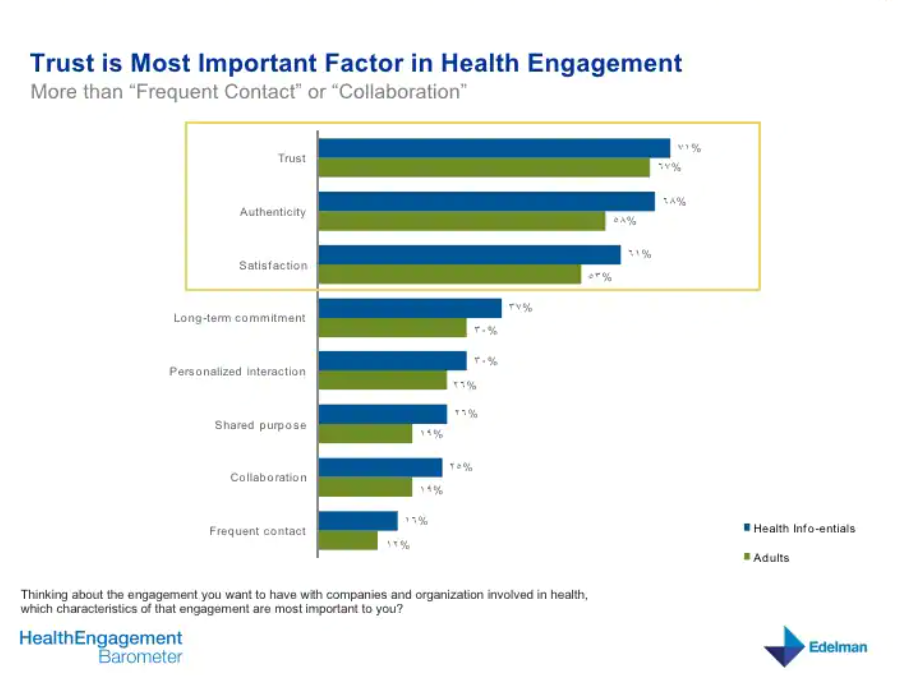With the collective pandemic-era pivot of people working from home, remote schooling at home, repurposing our homes for entertainment and fitness, and showing off home-baked goods on Instagram, has consumers’ comfort with new technologies accelerated?
 Morning Consult assessed this question in a poll timed to coincide with CES 2022, the annual conference dedicated to innovations in consumer electronics.
Morning Consult assessed this question in a poll timed to coincide with CES 2022, the annual conference dedicated to innovations in consumer electronics.
“Is the public ready for the innovations coming out of the 2022 Consumer Electronics Show?” the Morning Consult team asked.
“While brands may enjoy the initial buzz over these launches, it often takes a while for the public to become comfortable enough to fold them into their daily lives,” the Morning Consult analysts noted.
Most U.S. adults are most aware of and comfortable with wearable technology like smartwatches, shown in the first chart.
Data in this chart are based on the net difference between people comfortable using the technology versus those uncomfortable using it.
At the opposite end of comfort and use are self-driving vehicles, followed by blockchain and the metaverse — a hot topic in media and, indeed, at #CES2022.
After wearables in terms of consumers’ comfort and use are AI-based voice assistant and smart speaker tools, retail robots, virtual reality, and just above drawing the line at discomfort, package delivery drones and augmented reality.
Right on the line of comfort/discomfort are food delivery robots.
 In the second bar chart, Morning Consult assessed consumers’ comfort in sharing personal information in exchange for personalized benefits for retail, financial services, loyalty programs, and other quid pro quo’s.
In the second bar chart, Morning Consult assessed consumers’ comfort in sharing personal information in exchange for personalized benefits for retail, financial services, loyalty programs, and other quid pro quo’s.
For value exchange for shared personal information, consumers are most comfortable sharing email addresses (59% of consumers), shopping histories (sizes, style preferences, for 51%), full names (50% of people), mailing addresses (47%) birth dates (47%) and past transaction histories with retailers (45%).
Fewer people were comfortable sharing their data for driving behavior, geolocation/GPS, social media activity, internet browsing history, or credit histories.
And less than 1 in 4 consumers were comfortable sharing information such as driver’s license numbers, biometrics like DNA or fingerprints, banking information, passport numbers, or Social Security numbers which would be the least likely piece of personal data folks were comfortable sharing.
Underneath these statistics, people with more education and income are more comfortable sharing all categories of personal information with a higher level of trust with companies handling that data. And, men are more open to sharing their data than women.
Men are also generally more interested than women in trying out the various technologies. The biggest gaps in tech-comfort based on gender were for cryptocurrency (44% of men versus 25% of women interested) and using VR to test-drive a vehicle (47% of men vs. 30% of women).
Morning Consult polled 2,200 U.S. adults in early December 2021 for this survey,
 Health Populi’s Hot Points: Trust is a pre-cursor for health engagement, with authenticity running a close second as a factor that health consumers lean into when partnering with organizations for their health. This lightbulb moment finding happened in the 2008 Edelman Health Engagement Barometer study and it holds true today….
Health Populi’s Hot Points: Trust is a pre-cursor for health engagement, with authenticity running a close second as a factor that health consumers lean into when partnering with organizations for their health. This lightbulb moment finding happened in the 2008 Edelman Health Engagement Barometer study and it holds true today….
This is particularly impactful in the current moment as Elizabeth Holmes, founder of Theranos, was found guilty by a jury of her peers.
The Mercury News and East Bay Times editorial boards coined this the continuation of a “tech trust death spiral.”
For patients, caregivers and advocates, the intersection of trust, health care, and technology strikes at the heart of consumers’ concerned embrace of technology for their health and the well-being of loved ones.
This is a crucial enabling and success factor for digital health innovators to keep in front-of-mind during this week’s CES 2022 launch of med-tech that is aimed squarely at peoples’ self-care and the growth of our homes as health hubs. As the second chart illustrates, peoples’ comfort in sharing biometric data ranks relatively low compared with other forms of personal information.
As people increasingly understand the asset-value of their information in the growing surveillance economy, they will look for trusted stewards of that data — and especially for their health and well-being. Sharing our health data can benefit all patients, those alive today and those in the future. Sharing data is a form of paying-it-forward for peer patients and their families. Doing so reinforces a virtuous cycle that informs clinical research and health innovations.
Every technology that touches on health and well-being at CES is part of a connected health ecosystem. Wearable tech, remote patient monitors, connected fitness devices and other techs we’ll see coming out of Las Vegas this week all generate data.
Ensuring that data is used for good helps to bolster trust that motivates health citizens to share that data. Without building and constantly assuring that trust, we can’t reach those moonshots for the biggest health challenges, from public health crises like pandemics to cancers and rare disorders. Good design for health innovations should embed privacy-by-design principles for us all to get the most benefit from digital health.





 Grateful to Gregg Malkary for inviting me to join his podcast
Grateful to Gregg Malkary for inviting me to join his podcast  This conversation with Lynn Hanessian, chief strategist at Edelman, rings truer in today's context than on the day we recorded it. We're
This conversation with Lynn Hanessian, chief strategist at Edelman, rings truer in today's context than on the day we recorded it. We're